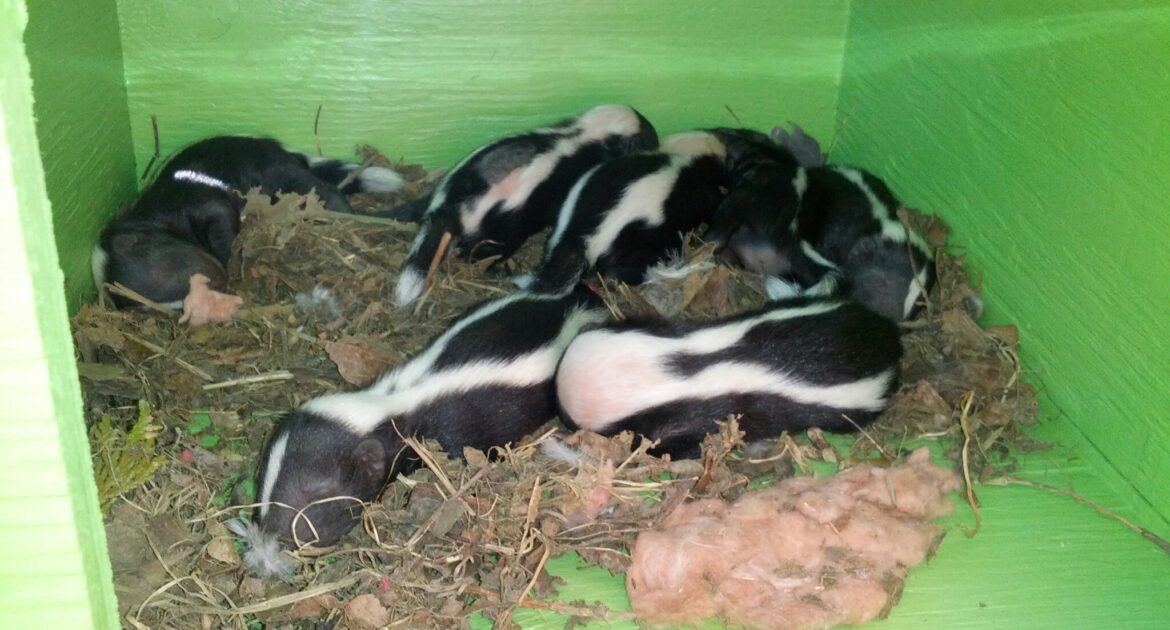If you are wondering how to get rid of skunks on your property, then it helps to understand why skunks act the way they do. Here are explanations of four common skunk behaviours and how each one helps a skunk survive in the wild.
1. Stomping and Hissing
When a skunk is on the defensive, it will stomp the ground with both front legs at the same time. If the situation escalates, it will bend its body so that both its face and its rear end are facing the opponent. It will then do a handstand and stomp with its back legs.
When a skunk is trying to defend itself from a predator or a person, it will also usually show its teeth and hiss. Hissing carries the same meaning for skunks as it does for cats: back off. If you observe a skunk stomping and hissing, then get away fast, because the next thing it is likely to do is to spray.
2. Digging
Skunks use their long claws to dig holes for two reasons: to create dens and to look for food. Dens are usually located in secluded places such as underneath rock piles or a porch. Skunks often modify unused burrows of other animals by digging them to the dimensions they prefer.
Worms and grubs are some of the most nutritious food items available to skunks, but skunks must dig to find them. The holes they make when foraging have a shape a lot like their noses: approximately 4 cm in diameter, 8 cm deep, and cone-shaped. If a skunk finds worms in your yard, then you will find many of these holes in a small area.
3. Keeping Their Noses to the Ground
Skunks do not have good eyesight, so they rely on their superior sense of smell to search for food as they walk. An adult must consume two kilograms or more of food each night, which is a lot when you consider the small weight of the following preferred natural food items:
- Insects
- Worms and grubs
- Eggs and nestling mice and birds
- Fruit and seeds
- Dead animals
Skunks also keep their heads low to sniff around for other information besides the presence of food. With their noses, they can detect predators, water, humans, other skunks, and a multitude of other objects and creatures in their environments.
4. Being Curious
Skunks are not so focused on finding food and defending themselves that they ignore a chance to explore and have fun. In fact, people who raise orphaned skunks attest that skunks have as much personality as a dog or a cat. One trait that all members of the species seem to share is curiosity.
Skunks are curious about anything new in their environments. In the wild, they will investigate unusual smells and sounds, and any objects that fell from a tree or that another animal left behind. This behaviour helps the skunks become experts on their home territories and also find new sources of food.
Behaviours on Your Property
If you are seeing skunks more regularly than you would like to, then there is probably something on your property attracting them. Consider whether you might have any of the following:
- Rock piles, woodpiles, outbuildings, or crawlspaces
- Plants bearing vegetables or fruit
- An over-watered lawn that might contain grubs and worms close to the surface
- Accessible garbage
- Pet food
Skunk Removal in Markham
Skedaddle understands that you may not want skunks around your house. If one has made a den under your porch or shed, call us to remove it humanely. We will also thoroughly inspect your property to determine why the skunks are there and how to keep them away for good. Fill out our online form or give us a call today.




